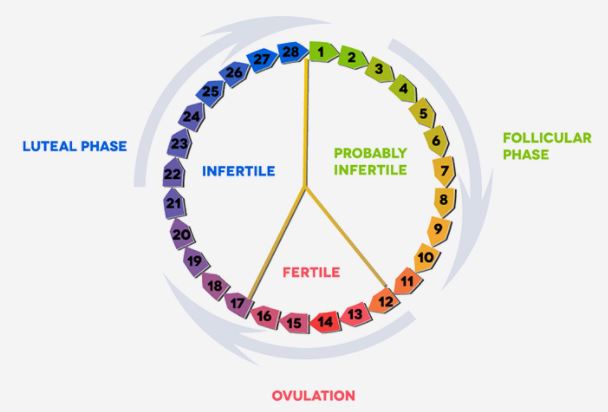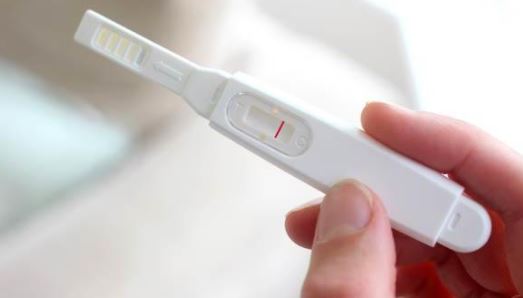It is important that each woman understands what goes on in her body after a period. This should be the case, whether one is trying to conceive or not. Each woman is unique, meaning that one’s hormonal actions differ from the other.
All women do not ovulate after every 28 days. In some rare cases, ovulation occurs during period. With increasing factors that could alter your cycle, it is essential that you be aware of the activities going on in the body each time in your cycle.
Understanding the menstrual cycle

Pregnancy is said to have occurred when a man’s sperm fertilizes a woman’s egg, and the fertilized ovum implants itself into the uterine.
If this does not occur the fertilized egg breaks down together with the thickened endometrium and shedding of the lining occurs.
Here are the activities of the menstrual cycle:
Day 1 of the cycle
This is the first day of your period. Shedding of the uterine wall occurs when the pregnancy hormones decrease in levels resulting to disintegration of the womb.
Day5-7
Your period is either over or almost over by the 7th day of the cycle. The menstrual cycle hormones increase in levels causing the development of graffian follicle which contains unfertilized egg.
Day 7-14
The follicles continue to develop in the presence of reproductive hormones. The uterine wall thickens as time goes by awaiting implantation to take place.
Day 14
The mature follicle bursts to release an egg. For a regular cycle of 28- 32 days, ovulation occurs during this duration.
Day 14-24
The egg is then propelled to the fallopian tube where it awaits fertilization to take place
Day 25 until period
If fertilization fails to occur, the hormones decrease rapidly causing breaking down of the endometrium (The inner uterine lining) and another cycle begins as the egg is disintegrated for next period.
Can I be pregnant just after my period?

Research claims that there is a possibility that a woman could be pregnant right after their period. However, a possibility of a pregnancy at time is quite low.
Women with a regular menstrual cycle do not ovulate until the 14 the day of their menstrual cycle. Unprotected sexual intercourse after the 14th day increases your chances of conceiving since this is the most fertile period in a woman’s cycle.
Women with irregular cycle are likely to get pregnant on the 7th day of their period. If for instance bleeding stops on this day, and you have sex on the same day, it is much possible that the sperm from day 7 will be in the fallopian tubes waiting for conception.
For women trying to conceive this is the best period to try, and for those who wish to prevent pregnancy, this is the time to have protected sex. Chances of pregnancy can be increased by frequent sex, for next 15 days.
Can I get pregnant after period with irregular cycle
Yes, chances of pregnancy after period increase with irregular cycles. With an irregular cycle, it means that you ovulate as soon as your period ends.
Women with irregular cycles get into their fertility days earlier than those with a normal cycle.
An irregular cycle is usually around 21-25 days. A sperm can last in a woman’s body for about five days. If for instance, you have unprotected sex 1 or 2 days before your period ends, you are likely to conceive 5 or 6 days later. This is because ovulation comes earlier than usual.
Irregular bleeding, what is the likelihood of pregnancy?
Some women experience irregular bleeding. Irregular bleeding occurs between regular periods and may cause prolonged periods. Most women experience irregular bleeding during ovulation or yeast infection.
With prolonged period as seen in cervical cancer and endometriosis, there is a possibility that you could be ovulation while still bleeding. Unprotected sex during these instances may lead to pregnancy.
How can I determine which days am likely to get pregnant after period?
Most women can track ovulation very well. However, there are other signs and symptoms of ovulation you can use to track your fertile period.
For regular cycles of 25-32 days, it simply easy to be aware of pregnancy as earlier as the 9th days of the cycle. If a woman with a regular cycle has an intercourse between 8th and 19th day of their cycle, the possibility of conception is usually high.
Other fertility signs that one should be aware of are:
- Increased basal temperature (By 0.5 degrees Celsius)
- Increased vaginal secretions
- Increased libido(Sexual desire)
- Light cramping usually on the lower abdomen segment.
Can I get pregnant 3 days after period?
Even though it is very rare to get pregnant 3 days after your period, women with irregular cycles or bleeding may stand a chance. This is because some may start ovulation as earlier as the third day post period.
After how many days after period can you get pregnant?
Women looking forward to conceiving ought to take a serious note on their ovulation dates. The fertile window period usually lasts 5 days in women with shorter cycle and 7 days in women with a normal cycle.
The trick to getting pregnant during your ovulation period is to start having sex 4-5 days earlier before your due ovulation date.
Can you get pregnant 5 days after period?
Because the sperm can live in a woman’s body for about 5 days, it is likely that you might conceive is if sex occurs before the 5 the day or on that particular day.
The safest days in a woman’s cycle are the days before her period. This is when you can have sex and get away with it. After a period, pregnancy is bound to occur any time.
The nearer you are to your ovulation date the higher chances of pregnancy.
SOURCES AND REFERENCES:
- Getting pregnant (May 2014): http://www.mayoclinic.org/healthy-lifestyle/getting-pregnant/in-depth/symptoms-of-pregnancy/art-20043853
- Periods (May 2014): http://www.nhs.uk/Conditions/Periods/Pages/Introduction.aspx
- Can I get pregnant after period just finished? (June 2024): http://www.nhs.uk/chq/pages/981.aspx
